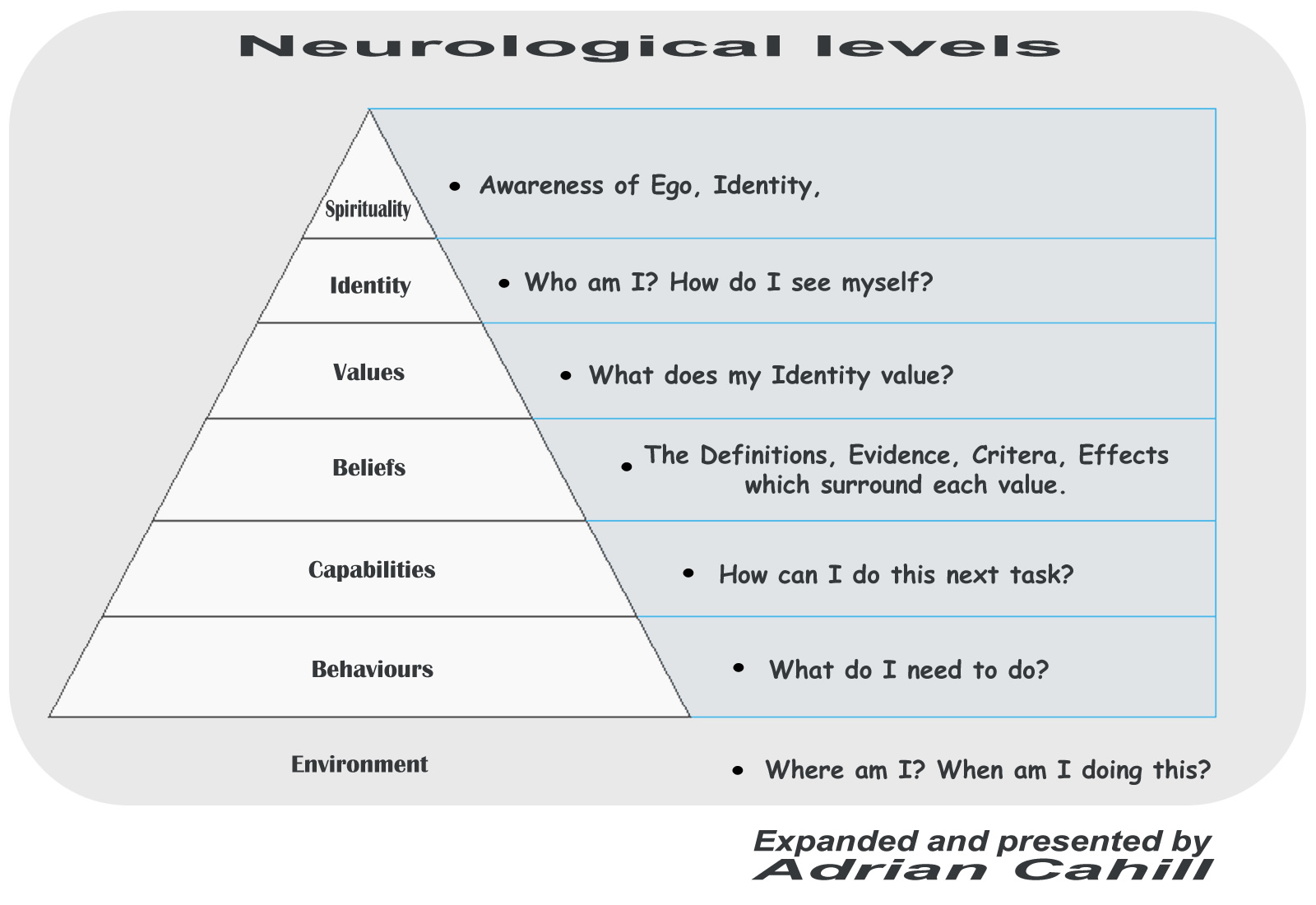Neuro Logical Levels (or Neurological levels) is one of the most interesting frameworks I have ever seen in the Coaching / Personal Development world. It is in my opinion the best NLP Coaching Model to date.
Regardless if you’re working as a change agent, or looking for change yourself, this will assist you in understanding and gaining a very high level of awareness of yourself and others.
Reading this alone will give you insight. Spending more time with it and revisiting it will bring more. If you practice it, you may find yourself able to recognise or even track conversations as they go up and down the levels. As an agent of change, you may begin to recognise on what level a presented challenge is at, where the deeper challenge is, and if you develop skills in Coaching/NLP with me, you will learn which models/tools/questions to ask to create trance-formation, or rapid change (perhaps both) with a big smile on your face.
Very brief background: Neuro Logical Levels is a METAPHOR. It was developed by Robert Dilts and is often taught in NLP and non-NLP Coaching Courses.
I’ve trained under John Grinder, and Richard Bandler the Co-Creators of NLP, and there students, Dr Robert Dilts & Dr Stephen Gilligan.
Deeper background: Neuro Logical Levels is a controversial but widely used model (and I would say effective model). One could say it is an extension of Logical Levels or Logical Types which was pre-NLP days. The levels and types were perhaps brought into the NLP world by Gregory Bateson. In his book, Ecology of Mind, (a challenging but enlightening read), Gregory eluded to deeper structures and in my opinion, was on the edge of many great discoveries of the mind. Gregory Bateson assisted the creation of NLP greatly and enthusiastically. He provided support and valuable introductions, like the introduction to Milton Erickson. Both Gregory and Milton spent time with one of the young NLP students Robert Dilts. Robert like many recognised there was like layers or levels of the mind, perhaps between reality, action, beliefs and Robert brought this model into the world. On a far deeper look at what are logical levels and logical types, this model according to John Grinder, Co-Creator of NLP, is not true to the rules of logical types. I was training with John Grinder and he showed my class how this model was false and not even a part of NLP however a fair few excellent trainers & coaches in the room disagreed with John. For me personally, military background, results-focused, this model worked a lot for me and I know it provides a lot of value to coaches so I’ll continue to use it. I teach this on many of our Coaching Courses, and NLP Coaching Courses. In my Master Practitioner of NLP Program, the only one like it in Australiasia, we go far deeper into every level and find NLP and Coaching models that are applicable on each level.
Note: this model has Values and Beliefs on different levels. This is the way it should be as a collection of beliefs make up a value. A value has but is not a belief. This is an important distinction as well trained (and experienced coaches) will often work more on a values level as it can collapse a collection of beliefs instantaneously rather than focusing on collapsing beliefs sequentially.
Neuro Logical Levels:

In the processes of learning, change, and communication there are, metaphorically speaking, natural hierarchies of logical levels. In logical levels, you have sets and subsets. wheels, frame, bumper, lights, can be parts of a car. Toyota, Ford, Tesla are cars. Cars are a form of transport. What is in and out of the level is upto the creators intentions. The intentions of Robert Dilts in creating this model, I believe was to assist agents of change in learning how to assist/create change.
Robert calls them, Neuro Logical levels as they reflect levels in the way we can process or think about them.
For example, if we are talking about offices in the context of; how noisy the office is, where the office is, how big is the office, how many people could fit in the office. These are all forms of focusing on the environmental level.
If we were to talk about someone bullying in the office, coming to work early or late, procrastinating about what to do, etc. This is all forms of focusing on behaviour. Behaviour in the office.
If we talk about a supervisor instructing staff to work overtime. This could be seen as a supervisor using their capabilities to affect behaviour.
Why is the supervisor instructing staff to work overtime? This may draw out some of the beliefs of the supervisor. They believe it’s their role or in their capabilities to instruct staff to change them. They may value, a performance bonus, or efficiency.
The supervisor, like all of us, has a value system, and perhaps they have a high value for work output. If they didn’t value work, they may not last long at the company. Some supervisors really seem to value, being in charge.
It’s like part of their Identity, a responsible leader. Perhaps at work, they assume the identity of a responsible leader. And at home, they may play the role or identity of a parent, or lover.
Spirituality means many things to many people. To our Supervisor, he may consider it a connection to a god, maybe a higher purpose.
All these words are metaphors, and this model is to assist us to process but don’t get to caught up or stuck in any part.

The function of each Neuro Logical Level in the hierarchy is to organize the information below it.
For example, a person’s behaviour results in changes to the environment around them. When a person walks into a room, they take up space and regardless of their behaviour, it will always affect the environment. The environment is generally the result of the persons behaviour. If the person regularly displays outstanding, high-performing behaviour, you would expect the environment to reflect this.
Changing something on a lower Neuro Logical Level of the hierarchy could, but would not necessarily affect the levels above it.
For example, if a person is regularly depressed, very messy, has disorganised behavioural patterns, one may imagine that if he changes where he lives, he will still have those behaviours. It could affect his behaviour. He could suddenly become excited, happy and organised if he was placed on Hawaii. However, his old behaviours were there for a reason. Those old reasons could still be present.
The problem as Einstein said, “You can’t solve the problem with the same thinking that created it.”
Often I see people that suffer from procrastination attempt to fix it with behavioural changes. I congratulate them on trying and have compassion for them as it won’t work. I see this all the time. People struggle to complete tasks, so they form new tasks! Only this time they add an exclamation mark or write IN CAPITAL LETTERS. I’ve also seen people struggle with procrastination buying online courses or books on productivity and sadly (perhaps obviously to everybody else) not finish them. The book or course may on the same level, behaviours, or it may be working on a level above the problem, here that would be capability. To avoid procrastination forever, (a rather simple feat if you know how) you have to work on higher levels then the problem hence the top-down approach used by most expert coaches/agents of change.
Making changes using a top-down approach.
For example, take a disorganised person and help them develop multi-tasking, scheduling, and organisational skills. This might work, only we may be taking on the challenge at the same level or slightly higher.
Making a change at the upper levels changes everything below it in order to support the higher level change. However working one level above the problem isn’t enough. The disorganised person, can still show a lot disorganised behaviour. Here the ‘Disorganised person’ is not a capability factor. Its part of their identity. The person may have grown up all their life being a disorganised person and no amount of capability changes will alter their behaviour if that behaviour is part of their identity. That’s like trying to move a tent, but the tent pegs are still in the ground.
If we work with the disorganised person on the level of Identity. And say, the Identity of the person is shifted and they see themselves as an efficient, successful person, the Values shift too. If something like, ‘Organised’ or ‘Being Organised’ becomes a high value, than the beliefs, capabilities and behaviour is also modified as a result.
You can use this model yourself and I encourage you to print out or copy this article.
Remember the following:
- Spirituality – Change for whom and/or what purpose?
- Identity – Does change reflect who I am?
- Values and beliefs- Why make the change?
- Capabilities and Skills- Change how?
- Behaviours – Change what?
- Environment – Where to change?
An insight into how I create my magic.
Honestly guys, 70% of what I do with people is work on the higher Neuro Logical Levels. This may be obvious, however often it’s done unconsciously. I may ask questions to someone about their challenge, then perhaps appear to ask unrelated questions about other things. These questions may lead to them focusing on the details of some of the biggest challenges they have accomplished. Then switch back to the challenge they were having currently and suddenly, they identify with the challenge differently. Suddenly, it’s not as big any more. So there you go and you can see how that can be very effective and also done without awareness.
What I really love is the amount of times I speak with someone, feel like it was nothing, but then a week later, get a message from them going something like.
“Adrian, you wouldn’t believe what just happened….”
Often people get immediate results, sometimes they take weeks. It’s amazing though how effective it is. And you can do some of this yourself! In fact, many of us are trying to do it ourselves every 1st of January, or on our birthdays. We attempt to redefine who we are with new years/birthday resolutions or simply buying gym memberships. Sadly though, a lot of these changes are just surface.
When we have enough leverage or need, things change. When we work with an NLP Coach we can manipulate and increase this need inside of a session.
Coaches without NLP rely on guiding/pushing/pulling or cheering you on to change. But as an NLP Coach, can artificially create a lot of leverage and then push it all at once, and collapse life long habits in seconds. Yes seconds. It takes minutes, perhaps half an hour to set up, then in seconds, the beliefs are suddenly wiped out! Sometimes at this point, the client, does a ‘transderivatal search’, thats like, the rug has been pulled out under your feet, your eyes are darting around going what the…. and it’s like suddenly the problem isn’t there. Then with that rug pull, we put in better beliefs, better program! Again, this takes seconds but this may take 20 minutes to set up too. So 20 minutes setting up the rug pull, 20 minutes setting up the new program then, 3, 2, 1, SWISH!!!! The brain grabs a hold of the new program, and were done. It can sound complicated. Most NLP Coaches in China can’t do it. Even higher percentage in my home country and USA probably cant do it. Being a NLP Coach in China, I got to practice it so many times, I nail it and can eliminate many habits, smoking, drinking (if the client really wants to kick the habit) in single sessions.
When I first wrote this, I had a participant talk about the hard time he had cutting back sugar. I gave him an artificial near death experience, and guess what? It suddenly became much easier for him to say no to sugar. In fact when I spoke to him 7 days later he had cut back his Sugar content 80-90% and was on top of the world. There is a reference on my Linkedin from another client that did the same thing, only he wrote it in a my Linkedin. Nice man.

Now that you have learned this:
Instead of listening deeply in every conversation, try listening briefly and keep an eye on the Neuro Logical levels. Now you should be able to identify which level the conversation is on. If you really want to take this to new heights join one of our coaching or training programs so you can not only know, but drive the conversation and create positive change in those you care about. Or perhaps just experience a lot of your own personal growth and development.
Thanks guys, Neuro Logical Levels was brought to you by Adrian Cahill. NLP Coach, NLP Trainer and ICF PCC (2500+ Coaching hours).
Feel free to contact me if you want to do any NLP or Coaching Training. I am lead trainer and often a co-trainer on various courses around Asia region and many of my colleges have great training in other areas. So just shout out!
Want lots of FREE RESOURCES?? Check out my resources page here!

A couple of us in NLP Trainers Training with John Grinder, Carmen Bostic and Michael Carroll
Register here for any future Coaching or Training.
Want to learn about NLP Coaches in China, or want to do NLP Coach Training? Register or just schedule a call.






Very good article. Can certainly see the value in mastering this.
Thank you for the session Adrian and explaining this to me. Now I can see this model and put our conversation in it I can see why your coaching is so effective. John wants to see you for a session or two as well. Do you want to call him or …
Hi Linda, glad you got a lot out of it. Thank you!
Feel free to introduce John to me. A real conversation is the best way to share/introduce people to coaching/nlp/change.
Adrian I can’t help but notice that when I search this model I find different version. WHy is that?
Hi Bruce. Thanks for comment.
Good Question. Rather than why, what is the purpose?
I think I just had an insight.
What is the purpose takes me up the levels. Why takes me down.
Great thinking Bruce.
Insight based learning is the name of the game. A coach helps people be the best version of themselves.
A coach helps you win at your game. What ever winning means to you. What ever game you are playing.
Tremendous value on this article and the explanation of the neurological level very understandable. Keep it up Adrian